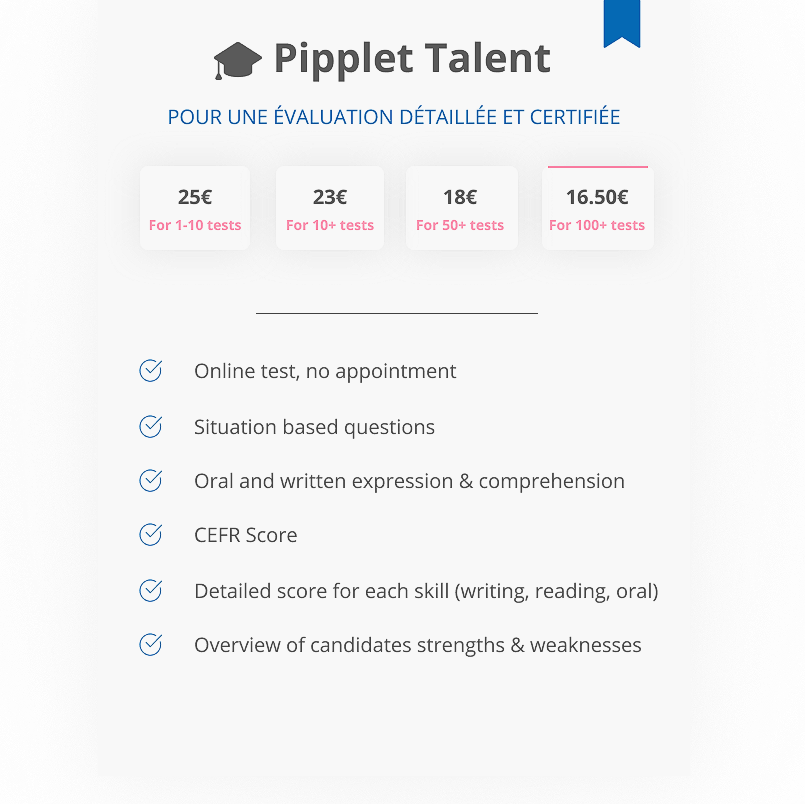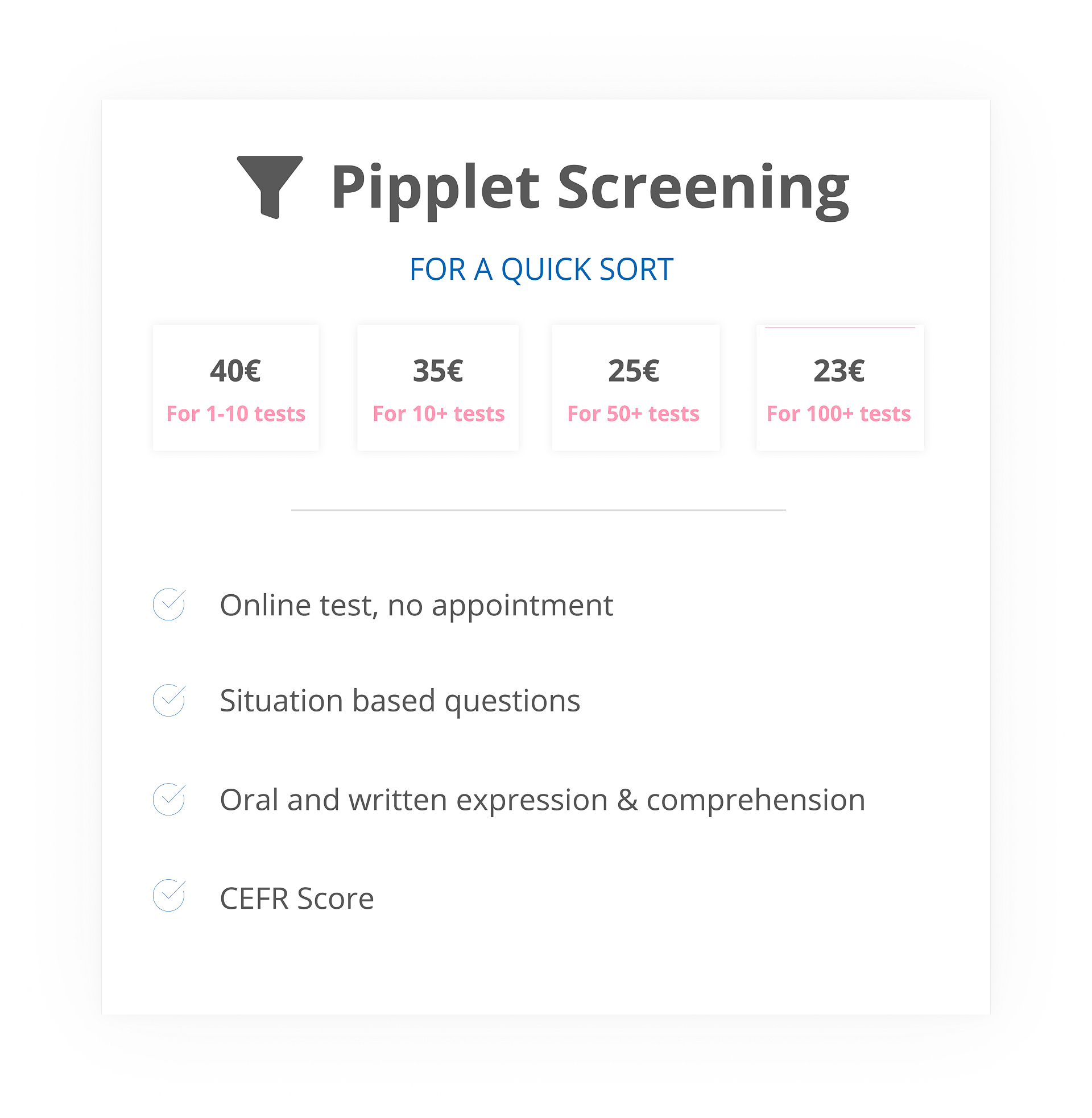When to test language proficiency in your recruitment process?
Pipplet Team • déc. 11, 2019
Last modified 17 July 2020 by Pipplet
Our language tests are used to evaluate job candidates. But when should one test language skills?
What is pre-employment skills testing?
Pre-employment testing is a standardized method of assessing a candidate’s proficiency or aptitude in a skill, in this case, language. It can function as a method to filter, distinguish, or further evaluate candidates. It is also useful in attaining detailed insight in a specific subject area and establishing more concrete knowledge about the candidate beyond their resume and cover letter.
Pre-employment testing is becoming a more common practice as it has been linked to higher quality hires, greater workplace engagement, and lower employee turnover. While it should not be used as a substitute for traditional hiring processes, it can be used to simplify the recruiting process.
There are numerous types of pre-employment testing that may be used depending on the job and its requirements. Some categories include, job knowledge tests, personality questionnaires, culture fit assessments, cognitive ability assessments, soft or hard skills assessments, and situational judgment tests.
What is a language test?
A language test falls under the category of hard skills assessments. In general, language tests are used to assess a candidate’s ability to function in different situations in the target language. They aim to evaluate a candidate’s knowledge of the structure, vocabulary, grammar, typically across reading, writing, listening, and speaking activities.
The most accurate linguistic evaluations are performance based and test these skills in a variety of scenarios to provide the best understanding of an individual’s language level.
These scenarios tend to be production based and interactive to assess the candidate’s comfort in producing the language based on auditory and literary comprehension.
Types of language tests
There are a variety of different language tests, each reflecting different functions and goals.
Placement tests: Used to place a learner at the appropriate level for their knowledge or to group individuals based on similar language skill
- Diagnostic tests: Used to gauge a learner’s level and areas of improvement and strength
- Achievement tests: Used to measure whether the candidate is meeting goals
- Proficiency tests: Used to measure how well a candidate is able to use the target language in practical scenarios, typically using performance-based evaluation.
- Aptitude tests: Can be used to assess an individual’s capability to learn languages
Should candidates be tested before or after the interview?
This decision ultimately depends on the nature of your recruiting process, the function you wish the language test to serve, and the importance of proficiency in the target language for the work environment. Are you looking for someone that is very proficient in the target language or someone with specific skills? Is someone that fits well with the company culture a higher priority?
In short, there is no right answer and it is important to analyze your priorities for the position and as a company.
Below are some guidelines to make this decision easier.
First Test, Then Interview: Filter
The main function this serves is to filter candidates, especially in environments where proficiency of the target language is integral to success in the position. Recruiters often note that many people glorify their resumes or provide false information. In this case, testing first can be beneficial in cutting the time spent reading resumes and conducting interviews, saving on managerial resources.
By setting a score cutoff, for example, and testing beforehand, candidates can easily be sifted through without effort. This has the capability of improving the hiring process as well since candidates are held against standardized expectations. Those genuinely interested in the position will take the time to do the language test.
In addition, as an interviewer, these test results can be taken as guidance and language skills can be observed further during the interview itself.
As a manager or recruiter, the interviewing process also becomes more personalized because fewer people must be interviewed. As a result, you can spend more time with your candidates and determine a more precise understanding of their workplace skills.
First Interview, Then Test: Distinguish/Further Assess
This can serve the function of distinguishing between candidates or further assessing their skills. Testing after the interview may be more appropriate for jobs in which language proficiency would be helpful but is not the primary skill required for success.
This helps to avoid losing otherwise competitive and skilled candidates who may just need to further develop their language skills. Testing after the interview is especially useful when it is difficult to make a decision between two candidates, and language competency would prove to be a significant advantage.
In addition, trying to offer a test before the interview could, in fact, slow recruitment since candidates may be reluctant to give a test before having interacted with the company. Similarly, they are likely to put more effort into a test depending on the nature of the interview, especially if it went well.
It is important to also note that using tests as a basis of elimination has the potential to discriminate especially if language is not one of the top skills necessary for success in the position. Take this into consideration when deciding where to place the language test in your recruiting process, understanding that if it is not a primary skill, it likely should not serve as a primary filter.
7 Benefits to Using a Language Exam
As an employer, there are numerous ways in which a language exam can benefit and ease your recruitment process. who are able to provide accurate and critical evaluations of your candidate’s language proficiency.
1. Job Success: Selecting individuals with the appropriate language level is more conducive of success on the job. Studies show that those with higher test scores are less likely to quit resulting in higher employee retention and a more productive workplace.
2. Accuracy: Tests are far more accurate than a perceived understanding of language level.
3. Standardized: Language tests use a standardized scale to evaluate candidates’ language proficiency level. Consequently, you have a more concrete understanding of your candidates’ capabilities making it easier to choose someone best fit for the job.
4. Easy Comparison: Tests allow for easy comparison of candidates to regulate and ease the decision making process.
5. Anonymous and Unbiased: Tests are often graded automatically or through a third party so there is no risk of bias in the results.
6. Less to think about in interviews: By using a language test, whether before or after your interview, you can focus on the candidate’s other job-related skills without having to evaluate their competency in the desired language at the same time. This allows you to spend more time getting to know the candidate.
7. Fair Recruitment: Your hires become more defensible since candidates are measured against a standard rather than self-declared or observed language proficiency.
Which Pipplet language and communication test is best for your candidate recruitment process?
Try our leading Pipplet Talent test
Our second recommendation is our Pipplet Screening test
Conclusion
Pre employment is becoming a more common practice across employers to simplify and standardize the hiring process. Among these are language tests which are essential for companies in which certain language capabilities are key to success on the job. Whether you test before or after depends on the importance of these skills to the position as well as the function you would like the test to serve, but either choice poses many useful benefits making pre-employment language testing an advantageous tool in the recruitment process.
Related stories

par Pipplet Team
•
19 mars, 2024
The role of human touch in the process of automated proctoring during online assessments is not just a measure of technological efficiency; it's a reflection of the company's values and respect towards potential employees. This human-centric approach is pivotal in enhancing the employer brand and maintaining candidate interest.

par Pipplet Team
•
27 févr., 2024
Explore the indispensable role of language in human connection, innovation, and globalization. Delve into how language shapes our communication, cultural identity, and educational advancements. Discover the transformative power of multilingual skills in the digital era and how Pipplet's online language assessments unlock opportunities for individuals and organizations worldwide.
Pipplet info
10 rue de Penthièvre, 75008 Paris
RCS Paris 813 493 673 00012
Pipplet 2022.
Tous droits réservés
Copyright © 2023 par Pipplet. Tous droits réservés. Toute utilisation ou reproduction non autorisée est strictement interdite. Pipplet est une marque déposée de Pipplet. ETS et le logo ETS sont des marques déposées d'ETS, utilisées sous licence en France par Pipplet.









